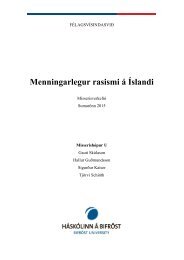You also want an ePaper? Increase the reach of your titles
YUMPU automatically turns print PDFs into web optimized ePapers that Google loves.
WORLD REPORT 2016<br />
HUMAN RIGHTS WATCH<br />
der identity has no direct correlation to sexual orientation or sexual behavior—as<br />
Human Rights Watch has documented in Malawi, Uganda, and Tanzania.<br />
Transgender people are also arrested under other pretexts, In Nepal, police arrested<br />
and sexually abused transgender women in 2006 and 2007 under the<br />
guise of cleaning up public spaces. Police targeted transgender women with arrests<br />
and forced evictions in India in 2008 as part of a similar “social cleansing”<br />
effort. In 2013, police in Burma arbitrarily arrested a group of 10 gay men and<br />
transgender women and abused them in detention.<br />
For many of the victims of these abuses, a future in which they may be legally<br />
recognized—and in which they will no longer risk imprisonment for being themselves—may<br />
seem far off. Yet it is precisely the persecution these individuals<br />
face that lends urgency to the struggle for legal gender recognition. It highlights<br />
that states should not be in the business of regulating peoples’ identity.<br />
A Shift in Medical Thinking<br />
The Yogyakarta Principles state that each person’s self-defined sexual orientation<br />
and gender identity is “integral to their personality” and is a basic aspect of<br />
self-determination, dignity and freedom. They are clear that gender recognition<br />
may involve, “if freely chosen (our emphasis), modification of bodily appearance<br />
or function by medical, surgical or other means.”<br />
Put simply, the process for legal recognition should be separate from any medical<br />
interventions. But if an individual’s personal transition process requires<br />
medical support, those services should be available and accessible.<br />
In 2010, the World Professional Association of Transgender Health (WPATH), an<br />
international multidisciplinary professional association, stated: “No person<br />
should have to undergo surgery or accept sterilization as a condition of identity<br />
recognition.” In 2015, WPATH broadened the scope of its claim and called on<br />
governments to “eliminate unnecessary barriers and to institute simple and accessible<br />
administrative procedures for transgender people to obtain legal recognition<br />
of gender, consonant with each individual’s identity, when gender<br />
markers on identity documents are considered necessary.”<br />
The World Health Organization is considering major changes to its revised version<br />
of the International Classification of Diseases, due out by 2018, which will<br />
significantly transform the ways physicians around the world code and categorize<br />
transgender people’s experiences. The proposed revisions, while still in<br />
draft form, would move transgender-related diagnoses out of the mental disorders<br />
chapter—an important step in destigmatizing transgender people.<br />
A Transitioning Rights Paradigm<br />
Learning from decades of transgender activists’ assiduous work around the<br />
world, the international human rights movement has slowly begun to recognize<br />
human rights violations based on gender identity and expression, and has<br />
begun to document and condemn the abuses.<br />
A landmark report by the Office of the High Commissioner for Human Rights in<br />
2011 on violence and discrimination based on sexual orientation and gender<br />
identity noted that most countries do not allow for legal gender recognition, so<br />
that transgender people may face many difficulties, including applying for employment,<br />
housing, bank credit or state benefits, or when traveling abroad. The<br />
follow-up report, issued in 2015, identified progress in 10 countries, but found<br />
that the overall lack of progress continued to impact a wide spectrum of rights<br />
for transgender people.<br />
Indicating both the groundswell of attention to legal gender recognition and its<br />
intersectional urgency, a joint statement in 2015 by 12 UN technical agencies—<br />
ranging from UNICEF to the World Food Programme—called on governments to<br />
ensure “legal recognition of the gender identity of transgender people without<br />
abusive requirements,” such as forced sterilization, treatment or divorce. In April<br />
2015, the Council of Europe issued a resolution, adopted by its Parliamentary Assembly,<br />
calling on governments to adopt quick and transparent gender recognition<br />
procedures based on self-determination.<br />
***<br />
The law should not force people to carry an identity marker that does not reflect<br />
who they are. Recognizing, in law, peoples’ self-identified gender is not asking<br />
governments to acknowledge any new or special rights; instead, it is a commit-<br />
30<br />
31










